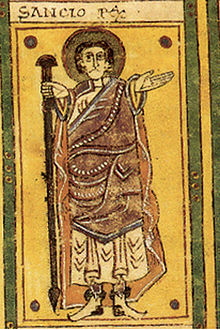Sancho Garcés II of Pamplona
| Sancho II | |
|---|---|

Sancho II of Pamplona, in the Codex Vigilanus
|
|
| King of Pamplona | |
| Tenure | 970–994 |
| Predecessor | García I |
| Successor | García II |
| Count of Aragon | |
| Tenure | 948–994 |
| Predecessor | Andregoto Galíndez |
| Successor | García II |
| Died | 994 |
| Burial | San Juan de la Peña |
| Spouse | Urraca Fernández |
| Issue |
García Sánchez Ramiro Gonzalo Urraca (Abda) |
| House | House of Jiménez |
| Father | García Sánchez I |
| Mother | Andregoto Galíndez |
| Religion | Catholicism |
Sancho Garcés II (Basque: Antso II.a Gartzez, c. 938 – dead 994), also known as Sancho II. He was King of Pamplona and Count of Aragon from 970 until his death in 994. He was the eldest son of García Sánchez I of Pamplona and Andregoto Galíndez. He recognised the Kingdom of Viguera during his reign.
He is sometimes referred to as Sancho Abarca by modern sources. This appellation was first applied to Sancho II by chroniclers writing centuries after his time who were confused about the succession to Pamplona, creating a single ruler out of the combined careers of Sancho II and his grandfather Sancho I of Pamplona. The weight of evidence suggests that this nickname originally applied to Sancho I.
Sancho Garcés was born circa 938, son of García Sánchez I of Pamplona, the second King of Pamplona from the Jiménez dynasty, and his first wife Andregoto Galíndez, daughter of Galindo Aznárez II, Count of Aragon. His maternal grandfather died without any legitimate male children, thus passing down the rights to the Count of Aragon to Sancho's mother who, in turn, passed them down to him and he became Count of Aragon, in 948, while still underage. He was initially under the guardianship of Count Fortún Jiménez. After the death of is father in 970, he became King of Pamplona and was known as Sancho II.
He appears mentioned on the occasion of a donation to the monastery of San Juan de la Peña in 987, when he titled himself "king of Navarre", being the first to use said title. This title, however, did not come into common usage until the late eleventh century.
Under Sancho, the kingdom solidified some of the gains of his predecessor, but also suffered several significant military setbacks at the hands of Umayyad troops. Navarre was linked with the Kingdom of León and the County of Castile by familial bonds, and the realms frequently worked in concert, with the Navarrese monarchy supporting the young Ramiro III of León.
...
Wikipedia
